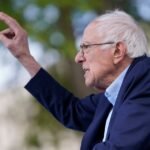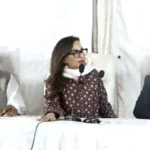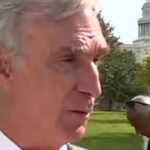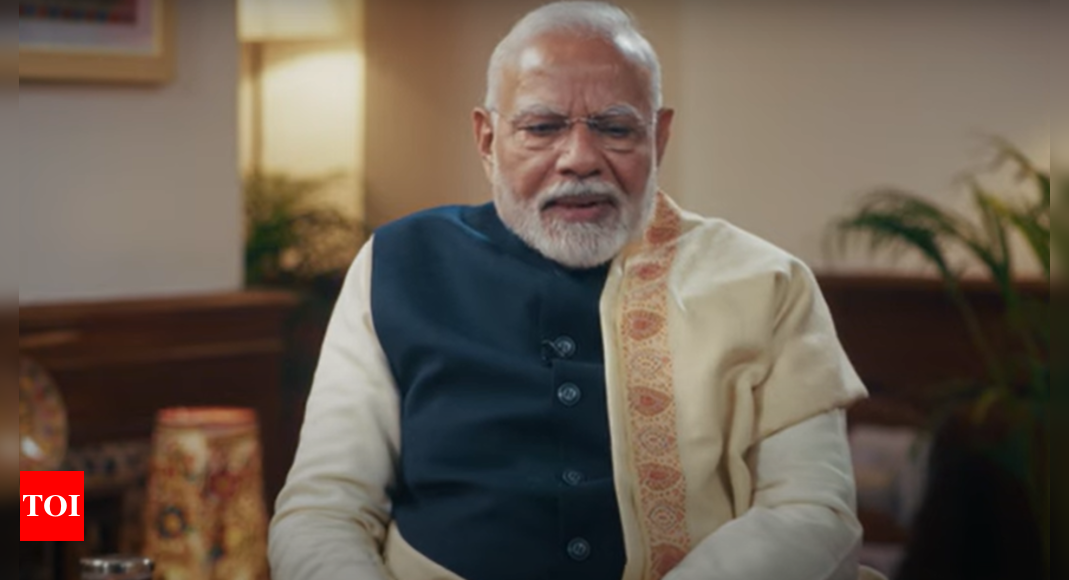NEW DELHI: Prime Minister Narendra Modi made his podcast debut when he appeared on Zerodha co-founder Nikhil Kamath’s YouTube channel. In a podcast lasting more than two hours, the Prime Minister spoke about his childhood, his friends, his ability to take risks, his vision for youth and more.
Here are the highlights from PM Modi’s interview:
“They didn’t notice me in any way”
Prime Minister Modi said he was a normal student when asked about his childhood. “He didn’t notice me in any way, but one of my teachers, Bheljibhai Chaudhary, used to encourage me a lot. One day he told my father, ‘He is very talented but he doesn’t concentrate,'” PM Modi said.
“But if the exams had elements of competition, I used to run away from them… just pass the exam somehow. But I used to participate in various extracurricular activities,” he said.
Why PM Modi didn’t like meeting old friends
When asked about childhood friends, Prime Minister Modi said, “I had left my home and all my relatives at a young age. I was spending my life as a wandering man, I had lost connection with everyone. When I became “In CM, I invited my old friends to the Prime Minister’s house. My intention was to show them that I was still the person who used to live with them years ago in the village.”
“About 30-35 of them came, we ate, we talked about old times… but I didn’t enjoy it because I was looking for friends while they looked at me like a CM. Now there is no one in my life who calls “You don’t tell me ‘you’ anymore ‘” said Prime Minister Modi.
Xi Jinping’s first call
Prime Minister Modi recalled the first call he received from China’s Xi Jinping and why he wanted to visit Gujarat.
“The Chinese philosopher Xuanzang had lived in my village. At that time, when I heard that a film was being made about this, I wrote a letter to the embassy saying that they should mention our village in the film,” he said.
“In 2014, when I became prime minister, I received courtesy calls from all world leaders to congratulate me. At that time, Chinese Prime Minister Xi Jinping called me and congratulated me. During the call, he said that he wanted to visit the India, specifically Gujarat, to its people Vadnagar,” the prime minister said.
You and I have a special connection. The Chinese philosopher Xuanzang spent most of his life in his village. But in the end, when he returned to China, he lived in my village. “We are both connected in this way,” PM Modi added.
‘I am a human being, not God’
“When I became CM, in one of my speeches, I said that I will leave no stone unturned in my efforts. Secondly, I will not do anything by myself. Thirdly, I am a human being, I may make mistakes, but I will not I will make mistakes with bad intentions. I made them the mantras of my life.” PM Modi said.
“It is natural to make mistakes, after all I am a human being, I am not God, but I will not do evil intentionally,” PM Modi said in the podcast.
Difference in three terms like PM
When asked about his different tenures as chief minister, he said, “In the first term, people were trying to understand me and I was trying to understand Delhi. In the second term, I used to think from the perspective of the past.” “In the third term, my way of thinking has changed, my morale is high and my dreams have grown.”
Speaking about the current mandate, the Prime Minister said, “I want solutions to all problems for Viksit Bharat by 2047… There should be 100% implementation of government plans. This is true social justice and secularism. The driving force behind This is – AI – ‘Aspirational India’.”
Mantra to succeed in politics
“Becoming a politician is one thing and being successful in politics is another… I think for that you need dedication, commitment, you need to be there for the people and you need to be a good team player. If you consider yourself above everything, thinking that everyone will follow you, maybe his policy will work and he will win the elections, but there is no guarantee that he will be a successful politician,” PM Modi said.
“If you see, all our unconditional leaders at the beginning emerged from the independence movement. Their thought process, their maturity is different… Their words, their behavior… everything reflects the utmost dedication towards society. So, “I think “Good people must continue to enter politics and also with a mission, not with ambition…” he added.
PM Modi on the ideology of Gandhi and Savarkar
Prime Minister Modi emphasized the importance of idealism over ideology and said that though politics cannot be done without ideology, idealism was very necessary. The Prime Minister said Gandhi and Savarkar had different paths, but their ideology was “freedom”.
“Idealism is much more important than ideology. Without ideology, politics cannot happen. However, idealism is very necessary. Before Independence, the ideology (of freedom fighters) was freedom. Gandhi had a different path, but the ideology was freedom. Savarkar took his own path, but his ideology was freedom,” PM Modi said.
Talking about his own ideology, the Prime Minister said that the nation must always be kept first.
“I’m not the kind of person who changes my stance according to convenience. I grew up believing in only one (type of) ideology. If I had to describe my ideology in a few words, I would say: ‘Nation first.’ The slogan “nation first” does not bind me to the chains of ideology and tradition. However, I am willing to let go of the old things and embrace the new. is always, ‘nation first’,” Prime Minister Modi said.
“My life has not been built by me. It has been made due to circumstances. The type of life that I have lived during my childhood has taught me many things. In a way, it was my greatest university. University of problems It has taught me a lot and I have learned to love problems. I come from a state where I have seen mothers and sisters walk two or three kilometers with a pot on their head… my activities are the result of empathy. The schemes or policies would have been implemented earlier, I don’t deny it, but I work hard to make the dreams come true. people,” added the Prime Minister.




